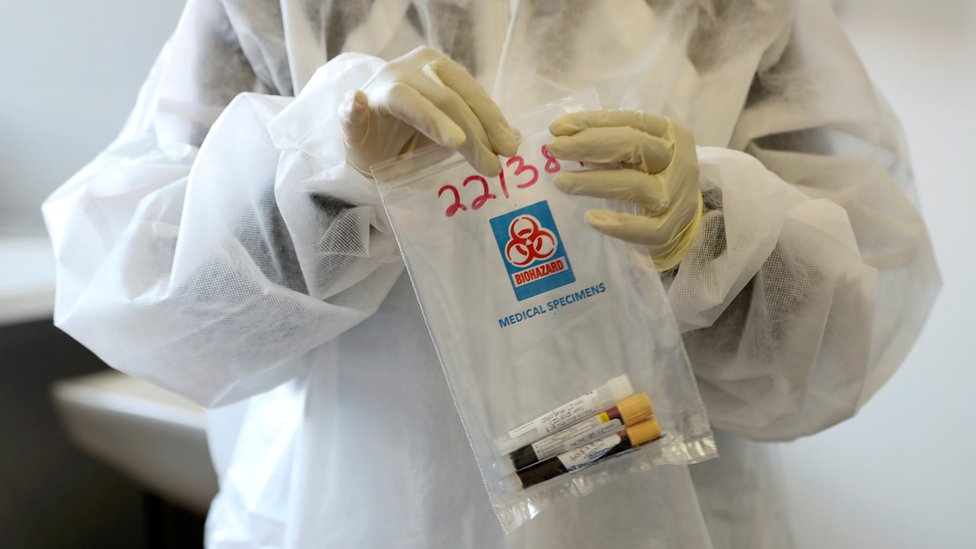COVID Complications in a South African Variant
"These two additional mutations may interfere more with vaccine effectiveness in the South African variant than in the U.K. variant.""This does not mean the existing COVID-19 vaccines will not work at all, just that the antibodies induced by the current vaccines may not bind and neutralize the South African variant as well as it would the other circulating viruses -- including the U.K. variant."Dr.Julian W.Tang, clinical virologist, University of Leicester"It is not anticipated that this mutation is sufficient for the 'South African;' variant to bypass the protection provided by current vaccines.""It's possible new variants will affect the efficacy of the COVID vaccines, but we shouldn't make that assumption yet about the South African one."Francois Baloux, professor of computational systems biology, University College London
| A member of medical staff attends to a COVID-19 patient at a special ward at Arwyp Medical Centre in Kempton Park, South Africa, last month. Scientists comparing the variant of the coronavirus found in South Africa to one first discovered in Britain have found concerning mutations in the one that emerged in South Africa. (Shafiek Tassiem/Reuters) |
"Fortunately, should further modifications of the vaccine be required to address the new variants, some of the vaccine technologies under development could allow this to be done relatively rapidly.""As the new variants are already spreading to other countries, the importance of ensuring that vaccines remain effective against new variants is a global imperative."Professor Helen Rees, vaccine expert , Wits University, South Africa
Some scientists in the U.K. and elsewhere admit to feeling fairly trepidatious over the appearance of a SARS-CoV-2 variant that is markedly different from the myriad of other mutations of COVID-19 that have emerged over time. The Medicines and Healthcare Products Regulatory Agency anticipates some work will have to be done on vaccines developed to stop COVID in its tracks. It has focused on how soon an altered vaccine might be ready to take on the task of controlling the newly-identified South African variant of COVID.
This version of the virus has mutated in a troubling way, though variants of coronavirus have appeared from the beginning of the pandemic, representing a naturally-evolving process through which viruses tend to adapt to their hosts while replicating. These mutations for the most part have no discernible effect beyond that of the original viral contagion though occasionally they may develop improvements enabling the virus to become more infectious, as is being seen in the U.K. variant.
It is when they have the potential to become more threatening, through resistance to the body's immune response that concern is raised. There are three mutations identified in important genes in the South African variants, one of which -- the N501Y mutation -- appears to have infiltrated the U.K. variant and could be seen as responsible for its enhanced infectiousness. There are two more mutations carried by the South African version of COVID -- E484K and K417N -- both absent in the British version.
The South African variant has mutated in a gene building spike proteins; the structures on the exterior of the virus enabling it to attach to human cells. These spike proteins are produced by vaccines to inform the body what to search for and what to resist. It is conceivable that any significant alterations to the spike protein could impact to the extent that the body's recognition of the virus is impaired, including once vaccinations take place; or in the event of a previous infection. The antibodies then produced in anticipation may be impacted, no longer capable of properly attaching to destroy the virus.
The possibility exists that the mutations may result in making it more difficult to detect COVID cases by means of the normal polymerase chain reaction testing, meaning the strain might have spread widely already. As it did in South Africa when it swiftly represented the dominant variant in the Eastern and Western Cape provinces of the country.
Prime Minister Boris Johnson is believed to have been briefed by the U.K. Chief Medical Officer and Britain's Chief Scientific Officer that the presence of the new variant does not leave them overly concerned. Should the South African variant become more widespread and dominant, available vaccines, including the two the U.K. just authorized can be appropriately modified for greater effectiveness against the variant in six weeks' time.
That existing vaccines will still be effective to some extent is a shared belief among most scientists. Researchers, already diligently at work, have now been spurred to work around the clock, determined to discover how dangerous the new variant is, relying on new lockdown measures to aid in stemming the tide, offering scientists time to devise a new solution.
 |
| There are concerns that the new Covid-19 variant in South Africa could "weaken the impact" of vaccines Reuters |
"We can all help if we redouble our efforts to wash our hands, wear a mask and socially distance."
"The faster and further the vaccine is rolled out, the quicker the end to this nightmare."
James Naismith, director, Rosalind Franklin Institute, professor of structural biology, University of Oxford
Labels: COVID Vaccines, Mutations, SARS-CoV-2 Virus, South African Variant

0 Comments:
Post a Comment
<< Home